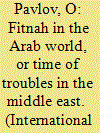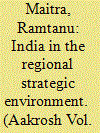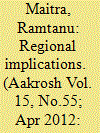| Srl | Item |
| 1 |
ID:
126633


|
|
|
|
|
| Publication |
2013.
|
| Summary/Abstract |
This study examines political, economic, and strategic relations between Libya and Britain from the Second World War to the 2011 'Arab Spring' conflict in Libya. Analysing primary and secondary sources, this study attempts to determine if a connection exists between the British fighting in Libya during the Second World War and the British-led military intervention in the Libyan 'Arab Spring' revolt against Muammar Qaddafi's regime. Britain retained a strategic and economic presence in Libya in the period following the country's independence in 1951. The rise to power of Qaddafi in 1969, however, changed the course of bilateral ties. Qaddafi nationalized British assets in Libya, and implemented anti-Western policies. Ties with Britain were strained, reaching a low point during the 1980s and 1990s with Libya's persecution of political dissidents in Britain. A brief rapprochement between Tripoli and London from 2001 to 2011 brought normalization of ties and renewed British investment in the Libyan oil sector. However, in February 2011, Britain and its western partners aided Libyan rebels in their fight against Qaddafi, successfully toppling his regime. Today, as the struggle for power continues in Libya - with Islamist groups representing a serious force vying for power - many questions remain concerning the future direction of the Libyan state and society.
|
|
|
|
|
|
|
|
|
|
|
|
|
|
|
|
| 2 |
ID:
111933


|
|
|
|
|
| Publication |
2012.
|
| Summary/Abstract |
NEARLY A YEAR HAS ELAPSED since the beginning of the Arab Spring; time has come to assess the preliminary results of the massive landslide started on a December day in 2010 by Mohamed Bouazizi, street vendor, who set himself on fire in a Tunis suburb to protest against police harassment and unemployment. This small stone set events in motion.
One after another the seemingly unshakable political regimes on the "Arab continent" were wiped out: two political doyens - Hosni Mubarak and Muammar Qaddafi - lost their "thrones"; President of Tunisia Zine El Abidine Ben Ali fled the country. Muammar Qaddafi lost even more than the throne - he lost nearly all his children and was shot through the head. Today when I am writing this article President of Yemen Ali Abdallah Saleh has come to the brink of resignation; King of Bahrain Khalifa still rules under pressure; the same can be said of President of Syria Bashar Assad. Reforms in Jordan are barely dragging on
|
|
|
|
|
|
|
|
|
|
|
|
|
|
|
|
| 3 |
ID:
118036


|
|
|
| 4 |
ID:
113151


|
|
|